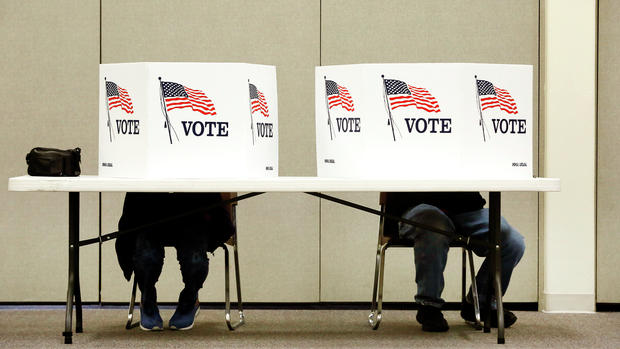We Have No Idea if Voter Fraud Changed the Outcome of Some North Dakota Elections

Voters fill out their ballot forms Tuesday, Nov. 4, 2014, at the St. Francis de Sales Church in Moorhead. Dave Wallis / The Forum
When the voter ID issue is brought up by Republicans the response from Democrats is usually a lot of dismissive sneering.
Voter fraud isn’t really a problem, they tell us, pointing to the lack of criminal cases involving voter fraud.
But is it that there’s no fraud? Or that we aren’t really doing anything to detect and address it?
Secretary of State Al Jaeger, in responding earlier this month to questions sent by President Donald Trump’s election integrity commission, pointed out that in the most recent election there were thousands of ballots cast by way of self-certifying affidavits (as opposed to identification) which have not, even now, been verified. Jaeger notes that fraud among these ballots could have impacted no fewer than eight close races across the state, five of which were won by Republicans and three of which were won by Democrats (see the full letter below):
Jaeger also noted that thousands of ballots cast with affidavits were from out of state, and that his office is still trying to verify whether those voters also cast ballots in their home states. He notes, depressingly, that even if fraud is found and prosecuted it cannot change the outcomes of the elections they influenced because those election results have already been certified:
What Jaeger is identifying here is the root of the voter ID debate. Again, Democrats tell us that we don’t need voter ID laws because instances of voter fraud are vanishingly rare.
The truth is that, under our current election laws, fraud could be happening and it could be impacting election outcomes, and not only can we not detect it in any sort of a timely fashion even if we did there’s little we could do to reverse already certified election results.
Remember, state lawmakers go into session just a couple of months after election day, casting all sorts of votes on legislation and other matters. How would we go about unwinding all of that if we found that fraud put someone in the Legislature who didn’t actually win their election?
We need to ensure that ballots cast in our election are valid when they’re cast. That means thorough and exacting voter ID laws.
To the extent that those laws are prohibitive to groups like the poor and the elderly, we should address that issue with outreach programs to get those people identification. Not lax laws which leave the ballot box vulnerable, which it clearly is today.
Here’s the full letter:
[scribd id=358292085 key=key-Wlff1Ndj3i9s0CY0AWes mode=scroll]






